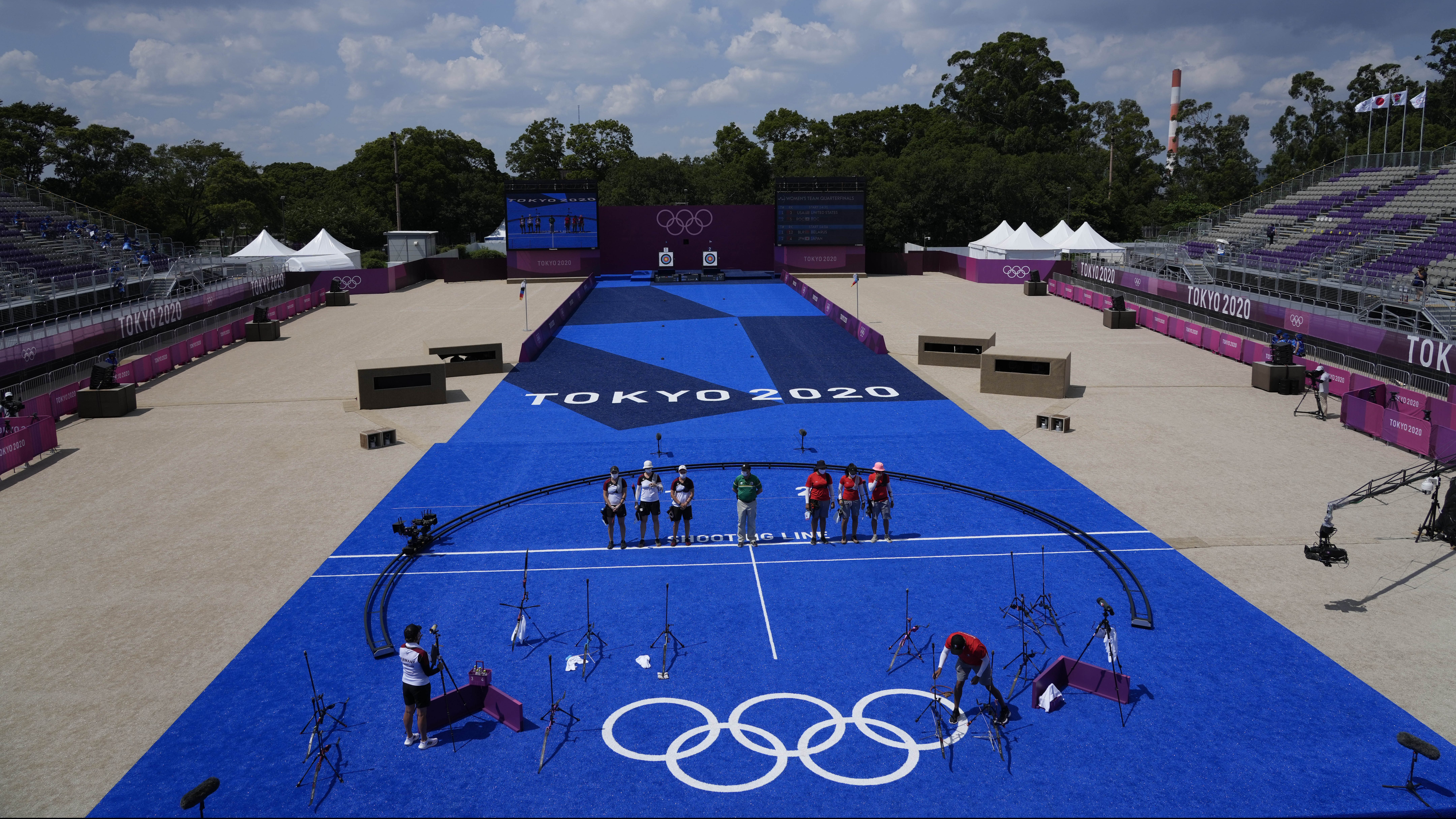The rains came to Tokyo on Tuesday morning.
After many days of blistering sunshine and summer humidity, enough to cause discomfort and heatstroke at some venues in recent days, the rain cooled Tokyo by about 10 degrees Tuesday morning, taking the edge off.
But worries about the effect of Tropical Storm Nepartak and its accompanying drenching have led to changes in Olympic events and some cancellations of practices as preparations for the storm proceed.
The storm is expected to make landfall in Japan on Tuesday evening.
Get Southern California news, weather forecasts and entertainment stories to your inbox. Sign up for NBC LA newsletters.
More Tokyo Olympics Coverage
Archery, rowing and sailing have already adjusted their Tuesday schedules. Tokyo Games spokesman Masa Takaya said there were no other changes expected.
“It is a tropical storm of three grade out of five, so you shouldn’t be too much worried about that, but it is a typhoon in Japan interpretation,” said Tokyo Games spokesman Masa Takaya. “This is the weakest category, but this is still a typhoon so we should not be too optimistic about the impact of the course."
On the beach about 60 miles east of Tokyo, the competitors want the change in weather so long as the rain and wind don't make total landfall. The surfing competition was delayed Monday because of low tide. But if the storm hits as expected, it could deliver waves twice as high as expected.
“As a homeowner I say, ‘Oh no, stay away!’” said Kurt Korte, the official Olympic surfing forecaster. “But as a surfer, ‘OK, you can form if you stay out there,’ Everybody can agree a storm out in the distance is the best.”
In advance, organizers made the first major alterations to the Olympic archery schedule because of weather. There was an hour delay at the Beijing Games in 2008. Here, the Tuesday afternoon sessions have been postponed until Wednesday and Thursday.
“We’ve heard that storm could be anything from rain or 80-mph wind,” said American archer Jack Williams.
Added Brady Ellison, his teammate: “Unless there’s lightning, right here, we’ll shoot it. We’ll deal with whatever it’s going to be. Rain just starts to suck in general.”
Beach volleyball plays in everything but lightning. Both the women's final at the Beijing Games and men's final at the Rio Games were held in heavy rain.
At Ariake Tennis Park, center court has a retractable roof that can be closed for inclement weather, but play on outer courts would have to be suspended.
“They can move every match, I think, if there is really going to be a typhoon with rain,” said Daniil Medvedev, the No. 2 player in the world. “We never know. I guess they will maybe try to move six matches, but it depends how long the matches will be.”
Any sort of rain — typhoon, tropical storm, or even light sprinkling — will be a wild swing from the first three days of the Games.
Svetlana Gomboeva collapsed from heatstroke on the first day of archery but recovered to win a silver medal. Top-seeded Novak Djokovic and Medvedev, who who complained his first round match was “some of the worst” heat he’d ever played in, successfully leaned on the International Tennis Federation to give Olympics players extra time during breaks to offset the high temperatures.
Anastasia Pavlyuchenkovahad resorted to shoving bags of ice up her skirt, and fiddled with a tube blowing cold air next to her seat. At skateboarding, the intense sun turned the park into a furnace, radiating off the light concrete with such blinding effect that skaters complained the heat was softening the rubber joints on their wheel axles and making the boards harder to control.
July and August in Japan are notoriously hot and humid. Japan has faced criticism for not accurately describing the severity and instead, during the bidding process, calling it mild and idea.
Daytime highs regularly hit 95 degrees (35 Celsius) but have exceeded 104 degrees (40 Celsius) in some places in recent years. The Environment Ministry began issuing heatstroke alerts in July 2020 for the Tokyo areas and in April for the entire nation.
Japan reported 112 deaths from June to September last year, as well as 64,869 people taken to hospitals by ambulance for heat-related issues. Tokyo logged the largest number of heat stroke sufferers at 5,836 during the three-month period.
Australian canoeist Jessica Fox, the gold medal favorite in the kayak slalom, said the wild weather swings have been a disruption to the Olympic event. “It is like a bath,” she said. “It is like paddling in bathwater.”
And the impending typhoon disruption?
“I am a bit concerned about that," Fox said. “I saw the surfers and they were all excited about the weather, which isn’t ideal for us.”
If Tuesday's bronze medal softball game is postponed, the Canada team worried it could get stuck in Japan because they had flights the following day.
“We very much hope that the game goes (Tuesday) so that we can get on a plane and go home,” coach Mark Smith said. “As you probably know, with the pandemic, that flights are very hard to come by."
The weather extremes are just another obstacle Olympic organizers have faced during these beleaguered Games, already delayed a year because of the coronavirus pandemic. Asked on Monday if Tokyo officials feel they can't catch a break, Takaya said they've had to be flexible.
“I mean, you know, we're supposed to react to any situation, that's one of our jobs,” he said. “This is absolutely a regular exercise we have to face.”
Associated Press reporters Andrew Dampf, James Ellingworth, Syd Fryer, Pat Graham, Sally Ho, John Leicester, John Pye, Jim Vertuno, Ronald Blum and Mari Yamaguchi contributed to this report.




